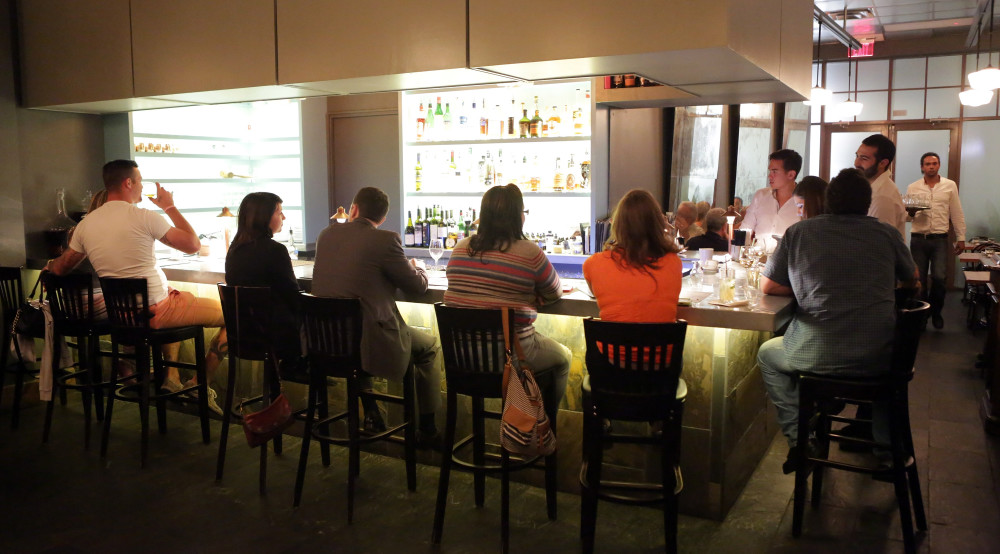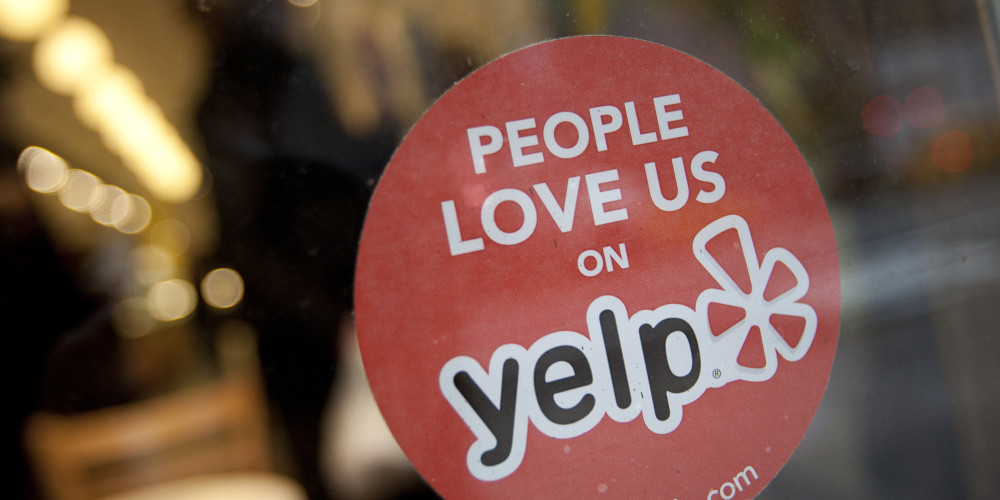By Philip Walzer
The Virginian-Pilot.
NORFOLK, Va.
For many local restaurants, summer brings a boost in customers, and Yelp reviews:
My steak was juicy.
My steak was too small.
The waitress knew the gluten-free options right away.
The waiter took too long to bring bread.
Yelp, which reports 162 million unique monthly users, illustrates the rise of online review sites and the digital transformation of private citizens into public personalities. Like a hot sauce with a lingering kick, it has burrowed deeply into the bottom lines, and psyches, of restaurant owners.
A Harvard researcher estimated that a one-star increase in a restaurant’s average rating, the maximum is five stars, yields a 5 percent to 9 percent rise in sales.
Yelp’s supporters see it as a potent tool to spread information to consumers and opportunities to businesspeople.
Critics in the food industry say it squeezes them in an unappetizing double-fisted sandwich, elevating the views of uneducated eaters while penalizing businesses that don’t advertise on Yelp.
“I have six years of culinary training, and all of a sudden my livelihood is left up to a person who watched two episodes of ‘Chopped’ and thinks ratatouille is a cute little cartoon,” groused Jeff Brown, owner of Cotton Southern Bistro, which has two locations, both with three stars.
Brown and Andrea DiCarlo, who owns La Bella in Ghent in Norfolk, which has a 3.5-star average, said they advertised for a few months on Yelp at $350 a month. After they stopped, they saw more negative reviews prominently placed on their Yelp pages.
“Six months later, the bad one keeps getting pushed to the top,” DiCarlo said.
Yelp steadfastly denies manipulating reviews based on advertising status.
“There is zero relationship between buying Yelp advertising and which reviews are recommended” on its website, spokeswoman Kayleigh Winslow said. Michael Luca, the Harvard professor who linked revenues to good reviews, also found that Yelp’s “current implementation of the filtering algorithm does not treat advertisers’ reviews in a manner different to non-advertisers’ reviews.”
But Winslow acknowledged an advantage for Yelp advertisers: Ads from rivals disappear from their pages.
Gautham Vadakkepatt, an assistant marketing professor at George Mason University, also found that “online word of mouth” boosts sales: A 10 percent rating increase triggers an average 4 percent increase in sales, he said. But, lingering credibility questions endanger Yelp’s future.
“I truly believe that if potential customers aren’t able to trust the reviews on Yelp, they’re not going to go to it,” he said.
Xerxes Nabong, a Yelp community director in the area, said the site is thriving as “a resource for people to find local businesses when the day is done.” Charles Thain, owner of Blue Seafood & Spirits, a 2-year-old restaurant with a five-star average, said at least one-quarter of patrons find Blue through Yelp.
“What Yelp and the other review sites have done is given a guy like me with shallow pockets an opportunity to compete in a market that has always been dominated by big advertising budgets,” Thain said.
And he hasn’t been hurt by not advertising:
“People think you’ve got to pay to play, but I’ve never given a nickel to Yelp.”
Yelp, launched in San Francisco in 2004, has 83 million reviews from 32 countries, Winslow said. Restaurants are among the most popular topics, at 19 percent, but reviews run from nail salons to urologists.
Seventy-nine percent of reviews are at least three stars, Winslow said, countering the image of Yelp “as a place for people to go and rant and complain about their experience.” But, like the sharp aftertaste of a biting salsa, the gripes are what stick with restaurant owners.
Phil Templeton, owner of the Amber Lantern Restaurant, which averages four stars, recalled the diner who panned a dish the eatery doesn’t serve. Another who complained his steak “had grill marks in it.” The one who groused: “I ordered my steak well done, and it was tough.”
“If you order your steak well-done, it’s going to be tough,” said Templeton, who dismisses Yelp as a “blog site.”
What peeves Brown are the “keyboard pirates,” like the woman who hated the meatloaf because it was topped with ketchup, who never complain when they’re at the restaurant. As DiCarlo put it: “When they’re here, they’re sort of passive-aggressive. When they leave, ‘I’m a tough guy now.'”
Restaurant owners say the worst reviews aren’t ignorant or petty; they’re fraudulent.
Brown and Templeton complained of disgruntled ex-employees who posted negative reviews on Yelp. On the other side, 19 companies were fined $350,000 by New York state in 2013 for posting fake positive reviews.
The Federal Trade Commission received 3,676 complaints against Yelp from Jan. 1, 2008, to Aug. 10, 2015, the agency said last week in response to a Freedom of Information Act request from The Virginian-Pilot. Of those complaints, 1,049 were filed last year.
The agency does not provide status reports, but a Yelp blog item in January said: “The FTC recently concluded a deep inquiry … and informed us that it will not be taking any action against Yelp.”
Yelp employs a two-pronged process to weed out questionable reviews, Winslow said.
A computerized system sifts out reviews that, for instance, include hate speech or appear “not to be coming from first-hand experience.” About 75 percent of reviews are “recommended” and listed on a business’ page. Those from veteran reviewers are more likely to make the cut. The other 25 percent don’t count toward the overall rating.
A team of researchers also “is constantly scouring the site and the greater Web to track down businesses who are attempting to deceive consumers.” Yelp has issued more than 130 consumer alerts this year about businesses suspected of falsifying reviews, Winslow said.
Yelp should do more, others say, such as requiring reviewers to reveal their full names.
“The anonymity of it almost makes you wonder,” said Jim Mayer, executive chef at One Fish Two Fish.
Yelp encourages reviewers to list their first names and last initials. But “it is the right of the consumer to choose to share their truthful experience anonymously, whether that be for privacy concerns or for fear of retribution,” Winslow said.
In April, the Virginia Supreme Court ruled that Yelp did not have to reveal the identity of seven people who posted negative reviews that the owner of a Northern Virginia firm said were fake.
Vadakkepatt, from George Mason, said it would help if reviews followed a format: “Now a review can be about the food or the service or about a particular employee. I wish they had some kind of system: Here are five dimensions.”
Templeton said “chefs who knew what they’re doing” should be the reviewers. Winslow’s response: “Customers have the right to write and read reviews about their experiences. … This provides valuable information to consumers and the marketplace.”
Marisa Strauss, a stay-at-home mom, estimates she’s written nearly 400 Yelp reviews, mostly fours and fives: “For me to write a negative review, it has to be really bad.”
In 2012, Strauss was named a member of Yelp Elite, a cadre of experienced reviewers whose title appears on their reviews. Nabong, Yelp’s local community director, said he could not disclose the number of local Yelp Elite writers.
Winslow said she could not say what percentage of Yelp reviewers belong to Yelp Elite.
Brown, from Cotton, questioned the qualifications of Elite members, but Strauss said: “I mainly trust the Elite. I know they’re serious about it.”
She gives less credence to non-Elite reviewers with little experience and few friends: “If they’ve written one or two reviews to let off steam, I think, ‘They had a bad day. I’m not going to trust that.'”
For a business that gets zinged, “the best way to handle it,” Strauss advised, “is to respond to it, either apologizing or asking them to come back.”
Howard Gevertz seconded the idea and said the response should be public. Gevertz teaches a class in social media at Culinary Institute of Virginia in Norfolk.
“If you’ve received a negative review,” he said, “you’ve got to be seen as proactive.” Maybe offer a free meal. “Get people back in to show them what you can do. Your loyal customers often come out of the fact that you were willing to address an issue.”
When Amber Lantern gets a poor steak review, “I’ll respond that we use Angus reserve steak, and that it’s the best quality available,” Templeton said.
A barbed review “is like somebody calling your baby ugly,” Brown said. “It hurts a bit, but at the same time you’ve got to pull something out of it.”
Some restaurants try to head off humiliation on Yelp with their own rating systems.
One Fish Two Fish, which averages four stars and does not advertise on Yelp, hands out comment cards with checks.
“If they’re upset about something, we can correct it while they’re still here,” Mayer said. At La Bella, DiCarlo plans to launch a similar system on tablets.
But the main way to “beat it,” DiCarlo said, is “to touch all the tables. Stop hiding in the kitchen, and make sure you communicate with your customers.”
















































































































































































































































































































































































